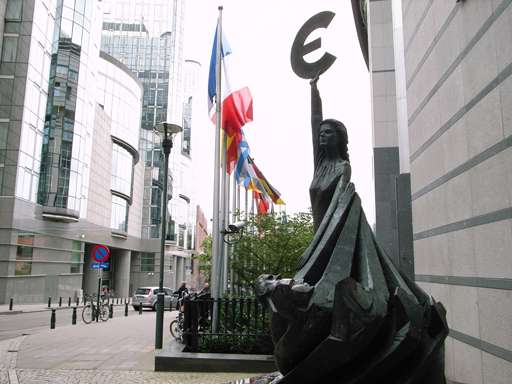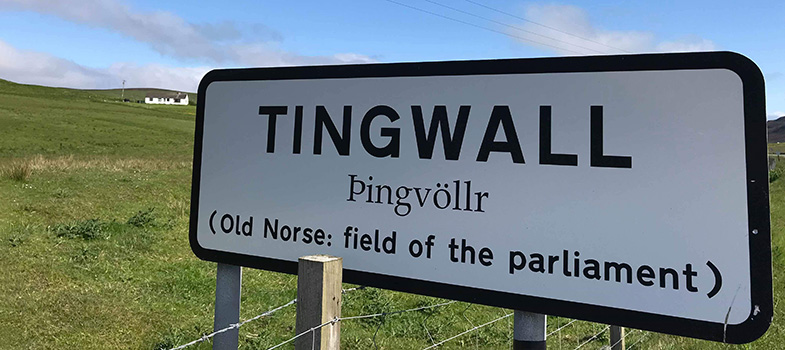5.5 Political recognition and protection of Scots
This section details how Scots came to have its first official government policy for Scotland, the UK and Europe.

The European Charter for Regional or Minority Languages (ECRML) was adopted by the Council of Europe in 1992 in order to protect and promote historical, regional, and minority languages in Europe.
In 2001, the UK Government ratified the Charter in respect of Scots and Scottish Gaelic in Scotland, Welsh in Wales, and Ulster Scots and Irish in Northern Ireland. Manx Gaelic and Cornish were subsequently added in 2003. Scottish Gaelic, Welsh and Irish were ratified under Part III of the Charter, which explicitly requires action to be taken. Scots, Ulster Scots, Manx Gaelic, and Cornish, however, were ratified only under Part II - which is predominantly a statement of objectives and principles, without explicit requirement for action.
The responsibility for the implementation of the Charter with respect to Scots and Scottish Gaelic was devolved to the Scottish Parliament. In practice, the action taken by the Scottish Executive (termed Scottish Government from 2007) has varied considerably over the years dependent on the priorities and approach to Scots of the party in government.
It would appear that the UK Government’s ratification of the Charter in respect of Scots in 2001 was not called for by the Labour Scottish Executive. The subsequent devolution of responsibility for its implementation to Holyrood was not greeted with enthusiasm. For example, this is an extract from a 2002 speech by the Labour Minister for Tourism, Culture and Sport, Mike Watson:
I dipped my toe in that water [debate as to language versus dialect status of Scots] at the Cross-Party Group last week, and my ears are still ringing, but the view had been taken, when the UK Government announced its intention of signing the Charter, that Scots will be firmly regarded as a language...
Action taken under the Labour Scottish Executive was minimal. When questioned in 2002 about what it was doing to protect and promote Scots under the European Charter, the Executive responded that it ‘[did] not consider that any action is necessary to comply with the European Charter for Regional or Minority Languages’, and that it had neither ‘formulated any policy on the numbers of speakers of Scots,’ nor ‘set any targets to increase the numbers of Scots speakers’ (Niven, 2002, p. 24; Bryce and Humes, 2003, p. 264).
Three years after the inclusion of Scots in the ECRML, in 2004 the Council of Europe's Committee of Experts reported as follows:
There is no official policy for Scots and the authorities whether at local or regional level (Scotland) have not taken any steps to protect the language.
The Committee of Experts has been informed of few initiatives undertaken to promote the Scots language.
The Committee of Experts has not received any information of any particular measures adopted by the Scottish Executive to facilitate and/or encourage the use of Scots.
This state of affairs did not change during the remainder of Labour’s time in power between 2004 and 2007, when the duration of the Labour Executive came to an end, and the Scottish National Party took the lead.
In 2007, the SNP formed what was now called the Scottish Government. That Government, between 2007 and the present day, has taken an active and positive approach to the Scots language. Some significant examples are outlined below:
- The establishment of a Ministerial Working Group (MWG) on the Scots language in 2009, which reported to the Government in 2010. Consisting of prominent Scots academics, writers, educators, and activists, the group members were tasked with advising the government on developing a strategy for Scots. See the full report of the Ministerial Working Group [Tip: hold Ctrl and click a link to open it in a new tab. (Hide tip)] .
- The inclusion of the first ever question on the Scots language in the 2011 census. This had been opposed by the previous Labour Executive.
- The creation in 2011 of the post of Minister for Learning, Science & Scotland’s Languages. Dr Alasdair Allan, a speaker and advocate of both Scots and Gaelic, was appointed to post.
- The appointment in 2014 of four Scots Language Co-ordinators, to support and promote the teaching of Scots in Scottish schools.
- The publication in 2015 of the first ever Scots Language Policy. The policy clearly states the importance Scots as one of the three indigenous languages of Scotland and sets out the Government’s intent to expand its usage into all aspects of public life. The policy itself was produced in both Scots and English, embodying the Government’s commitment to promoting Scots as a language appropriate for all forms of communication.
Please note: The SNP had also previously supported the introduction of a Scots Language Act. The SNP’s commitment to equal legal status for the Scots language in the form of an Act was dropped in 2007. This was a time when polls suggested that the SNP may overtake Labour as the largest party in the Scottish Parliament. Perhaps the SNP took greater account of the likely political and financial pressures of running a government?
Respected author and Scots activist, James Robertson, for example, notes that, given that Scots has perhaps as many as 25 speakers for every one speaker of Gaelic, ‘one can see why the thought of spending 25 x the Gaelic budget on Scots is a scary prospect’ (Douglas, 2016, p. 36).
Activity 11
To summarise, take a note of what you consider the milestones that led to the level of official recognition the Scots languages has in Scotland today.
Answer
This is a model answer. Your milestones might be different.
- 1992 – ECRML
- 2001 – UK Government ratified the Charter in respect of Scots and Scottish Gaelic in Scotland, Welsh in Wales, and Ulster Scots and Irish in Northern Ireland
- 2007 – SNP came into power
- 2009 – MWG on the Scots language
- 2010 – MWG report to Scottish Government
- 2011 – inclusion of the first ever question on Scots in a census
- 2014 – appointment of 4 Scots language coordinators
- 2015 – Scots Language policy launched
5.4 Scots: Parliamentary discussion
